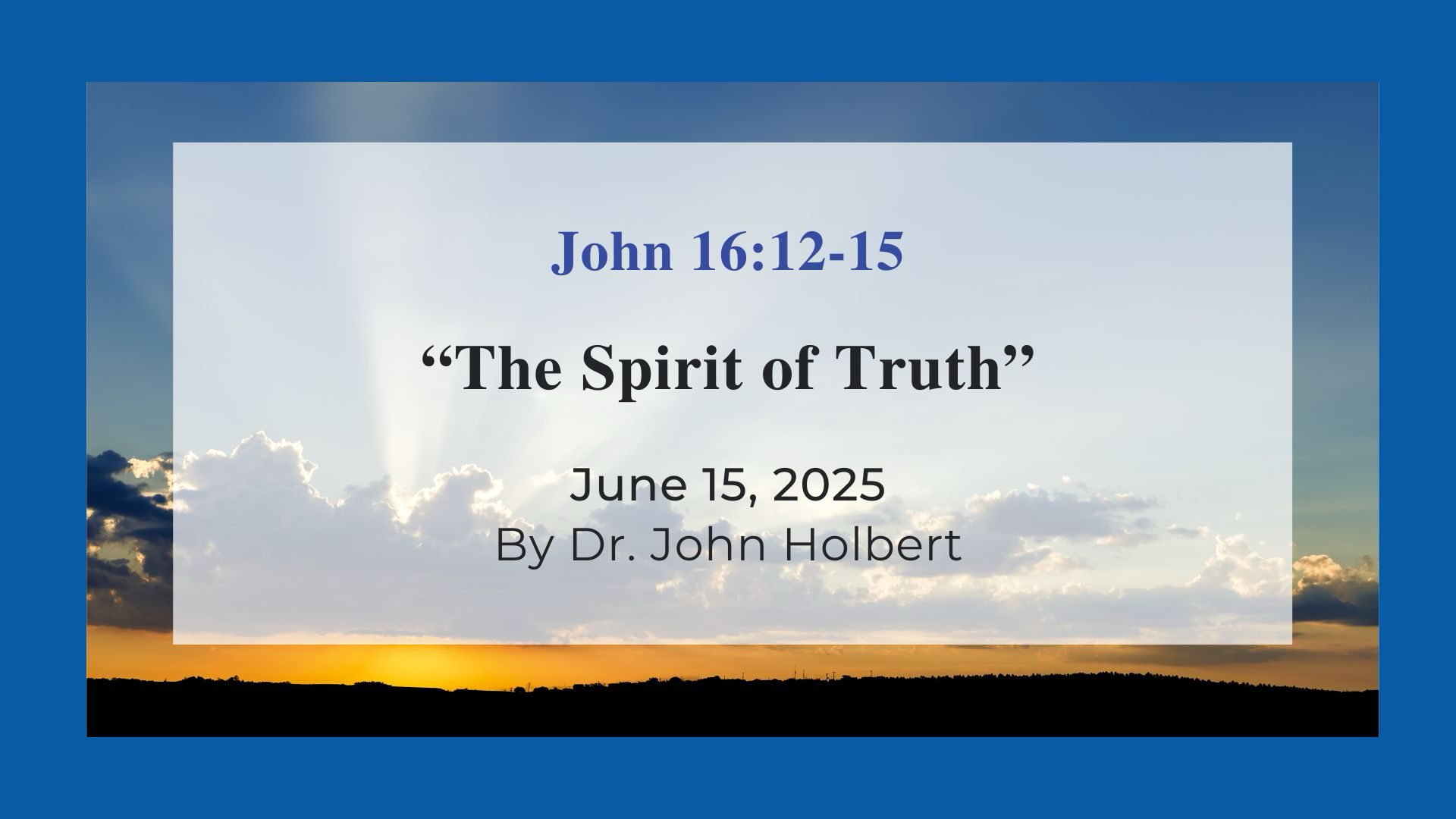The Spirit of Truth - Reflections on John 16: 12-15, Trinity Sunday, Year C
by John C. Holbert on Thursday, May 1, 2025

As I noted in my essay on Proverbs 8, the figure of Woman Wisdom, a near consort of YHWH in that remarkable passage, may well be the precursor of the much later doctrine of the Trinity, that conviction that God, Jesus, and the Spirit are each equal in substance and purpose with one another. In other words, when one prays to God, one is at the same time praying to the other two; each is fully equal to the other. And as I have also noted, I do not find such a belief either understandable or significant for the constitution of my own faith journey. I do not experience Jesus as divine, and I imagine the Spirit to be something like God’s nickname, one of the ways that God may be present in our lives.
Given those presuppositions, any reader may think that I am not enamored with the Gospel of John, whose Jesus is fully divine from the very first chapter. He is “the Word,” that Word that is both God and Jesus all at once. Indeed, the idea of the Trinity surely arises from a certain reading of this Gospel, though, despite considerable argument to the contrary, John does not clearly delineate such a doctrine anywhere in his book. Today’s text, John 16:12-15, does refer to that mysterious figure, the Advocate, who will replace the absent Jesus after he has “returned to the Father,” as John’s language has it. To be sure, says John, Jesus must return to the place of his origin if this Advocate is to take his rightful place as the “Spirit of Truth” for the disciples who are called to carry on the work begun by Jesus. John’s particular prose style is especially thick in this section and must be read carefully if it is to be understood and appreciated.
Jesus begins the chapter with a stark warning to his followers about what they can soon expect from those who “have not known the Father or me” (John 16:3), namely mortal persecution: “They will put you out of the synagogues. Even more, an hour is coming when those who kill you will think that by doing so they are offering worship to God” (John 16:2). Grim language indeed! Jesus then says: “Now I am going to him who sent me,” which is itself a difficult statement to hear, but then adds: “Nevertheless, I tell you the truth: it is to your advantage that I go away, for if I do not go away, the Advocate (or “Helper”) will not come to you; but if I go, I will send him to you” (John 16:7). And precisely what will this Advocate do? His role appears decidedly complex! “And when he comes, he will expose the world concerning sin and righteousness and judgment: concerning sin because they do not believe in me; concerning righteousness, because I go to the Father and you will see me no more; concerning judgment because the ruler of this world is judged” (John 16:8-11). As peculiar as all that sounds, it represents in fact the central claims of John’s Gospel.
The Advocate (paraclete in Greek) will perform three actions on behalf of Jesus. First, he will reveal the true sin of the world in its refusal to believe in Jesus (see 12:48a). “The world knew him not,” as John says in chapter 1, and that basic rejection of Jesus as God manifest in the flesh is the world’s basic sin. Second, the Advocate will expose the world’s understanding of righteousness as false, because it only grasps Jesus in terms of the world; John 12:43 has never been resolved. Jesus’s opponents preferred “the glory of humanity” to the “glory of God,” the latter of which Jesus represents. Thirdly, and perhaps most importantly, the Advocate will expose the basic false judgment of the world, believing that the death of Jesus is not the end, but the beginning of his revelation of the glory of God, at the very moment of his return to the Father. In reality, the so-called victory of the world’s ruler over Jesus is really the exact opposite; Jesus’s death reverses the judgment of history completely.
And when the paraclete appears, “he will guide you into all truth,” and will “glorify me, because he will take what is mine and declare it to you. All that the Father has is mine” (John 16:14-15). In short, God has shared all with Jesus, and Jesus has imparted all of it to the Advocate, who will now relate it to those who would be followers of Jesus after his glorification in death and resurrection.
John employs richly philosophical language to express his belief that God, Jesus, and the Advocate are one. This is, as it is plain to see, the essence of what we know now as the doctrine of the Trinity, or at the very least the seeds of that doctrine. Thus, the text of John 16 is fully appropriate for this Trinity Sunday. I urge you to think about your own appropriation of this Christian belief as you work your way through these texts, as I have tried to do. The joy of being a Christian is to savor and question those notions that the tradition has provided for us and to share those explorations with our congregations. There are rarely “right” answers to these ancient questions, but the study of them and struggle with them remains one of our greatest gifts from the faith. That study and struggle are for me “the spirit of truth.” As a rabbi once said, “An hour of study is in fact an hour of prayer.” I quite agree!
